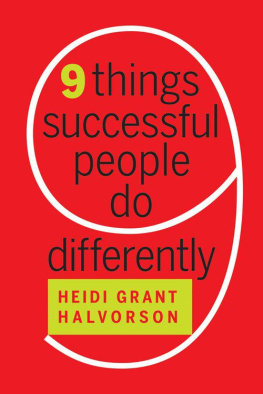Heidi Grant Halvorson, Ph.D.
USA / Canada / UK / Ireland / Australia / New Zealand / India / South Africa / China
First published by Hudson Street Press, a member of Penguin Group (USA) Inc., 2013
All rights reserved. No part of this product may be reproduced, scanned, or distributed in any printed or electronic form without permission. Please do not participate in or encourage piracy of copyrighted materials in violation of the authors rights. Purchase only authorized editions.
Im reluctant to take on new tasks and embrace challengehow can I change?
I start projects with enthusiasm but then I fizzle out. How can I stay motivated?
How can I get a student whos putting in little effort to put in more?
Why does the skills training we provide to employees seem so ineffective?
How often have you heard questions like these being asked? How often have you been the one doing the asking? Whats truly amazing, if you think about it, is not how universal these questions are, but how long they have been around, and how long they have gone unanswered.
We humans are awfully clever. We are capable of self-awareness, introspection, critical thinking, and reasoning. But we still cant seem to get a handle on what makes us tick. Long ago we mastered the ability to create and harness fire, but we still dont know how to light and maintain the fire that inspires us and keeps us moving forward.
We need to understand how motivation works. Our ability to live successful, satisfying livesand to help others do the samedepends on it. We suspect we might be missing the right stuff within us. As managers, parents, and teachers, we want to cultivate the right stuff in others. But what is it? We go on a hunt for the Answer. We buy books, read articles, attend seminars, and generally spend a lot of time and money, never really finding anything that seems like the Answer were looking for.
Would you like to know the Answer? OK, here it is:
There isnt one.
Im sorry, I forgot the italics: There isnt one. And therein lies the problem.
Imagine that you make an appointment to visit your doctor to discuss your recurring bouts of stomach pain. You walk into the examining room prepared to give her the rundown of your symptoms and the remedies youve tried so far. But before you can begin, she takes one look at you and says, Obviously, you arent feeling well. You should take some ibuprofen and lie down for a while.
Hang on, you say. Dont you want to know whats wrong with me?
I do knowyoure not healthy; otherwise you wouldnt be here. These recommendationswhich I give to all my patientshave been shown to make people feel better, so Im sure theyll do the trick. She hands you a sample pack of Motrin and a fluffy pillow and bids you farewell.
At this point, you would probably come to the conclusion that your doctor is an idiot. In reality, no physician (I hope) would diagnose and treat a patient that wayas if all illnesses were of essentially the same nature and could be cured in the same manner. But this is exactly how most of us approach the problem of underperformance, whether its our own underperformance were worried about or that of our employee, student, or child.
Just like the misguided doctor, we assume that treatments that have been shown to improve motivation and performance in somestaying positive, offering rewards, providing opportunities for skill development, setting specific goalscan help any underperformer improve. But experience tells us that this isnt so.
There are no one-size-fits-all ways to get people motivated. Anyone who tells you that doing X will help you get the most out of your employees, your students, or even yourself isnt telling you that, at best, X only works for some people some of the time. That makes the picture much more complicated.
Of course, doctors dont generally act this way in real life, because they have an advantage with respect to medicine that the rest of us lack when it comes to motivation. Thanks to four long, expensive years of medical school, they have been trained to recognize that different illnesses have different symptoms, and that they can use these symptoms to form a diagnosis and prescribe a course of treatment tailored to the problem at hand.
Like illness, underperformanceor, more generally, not being able to reach our goalsdoes not have a single psychological cause. If you want to get someone whos not putting in a lot of effort to put in more, you need to start by understanding why hes not putting in effort, because there are several different possible explanations. What we need, if we want to address underperformance meaningfully and effectively, is a way to distinguish among the different kinds of underperformers we may encounter, using their patterns of behavior to identify them in much the same way doctors use heart rate, body temperature, and blood tests.
Once you know what youre dealing with, you can begin to treat the problem with a targeted cure, with strategies that are scientifically proven to work on your specific motivational ailment.
With this short book, youll begin your training as a Doctor of Motivation. Ill introduce you to eight profiles of achieverseach distinctive in their behavior, preferences, and emotional experiencesand explain how you can understand each profile as having a particular mindset and motivational focus, coupled with either low or high confidence. Once you are able to recognize each profile, Ill describe the options you have for increasing effectiveness and engagement in that kind of achiever.
First, youll need some background on mindsets, motivational focus, and the nature of confidence.
Mindsets: Be-Good and Get-Better
We all approach the goals we pursue with one of two mindsets. (I wrote about them extensively in my earlier book, Succeed: How We Can Reach Our Goals.) The first is what I call the Be-Good mindset, in which the focus is on proving to yourself that you have a lot of ability, demonstrating that ability to others, and receiving validation for it. In other words, you want to feel smart, look












 REGISTERED TRADEMARKMARCA REGISTRADA
REGISTERED TRADEMARKMARCA REGISTRADA